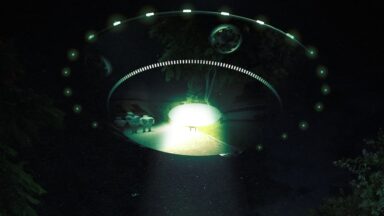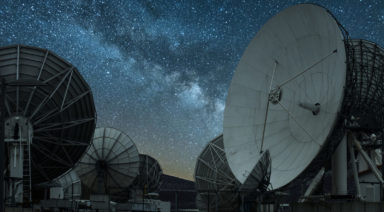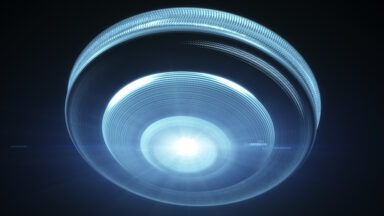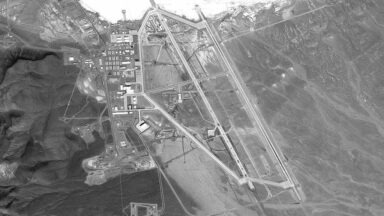Scientists Find More Mysterious Repeater Signals From Deep Space
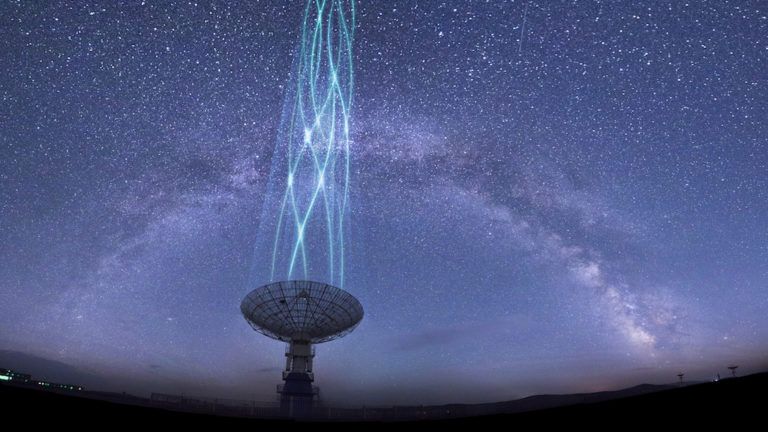
Another set of mysterious “fast radio bursts” (FRBs) from a distant galaxy were recorded by astronomers at the Canadian Hydrogen Intensity Mapping Experiment (CHIME) in British Columbia. Scientists are still unsure of the source of these strange bursts, though one potential explanation posits that they may be the product of an advanced alien civilization.
The latest bursts are the first recorded from this source since it was accidentally discovered in 2007. Astronomers remain baffled by this latest recording, which detailed signals at a significantly lower frequency than their first discovery. Initial frequencies clocked in at 1,400 megahertz, but the latest bursts came in at around 400 MHz; the lowest possible frequency their instruments could detect.
Is this potential alien civilization sending signals at varying ranges to increase its chances of being heard? If so, it seems we’re picking up all of them.
Though they were first discovered in 2007, speculation around the FRBs’ origin didn’t captivate headlines as much as it did in 2017 when Professor Avi Loeb of the Harvard-Smithsonian Center for Astrophysics published a paper suggesting the alien possibility.
“Fast radio bursts are exceedingly bright given their short duration and origin at great distances, and we haven’t identified a possible natural source with any confidence,” Loeb said. “An artificial origin is worth contemplating and checking.”
There are two competing theories on the extraterrestrial potential; the first being that a civilization is transmitting their calling card in hopes of contacting another civilization like ourselves. The other possibility is that the bursts are propelling the sails of alien probes in deep space – a type of technology the Breakthrough Initiative is currently attempting to develop.
Astronomers noticed that whatever the source of these waves may be, it’s scattering the radio bursts – meaning it must be a massive object with “special characteristics.”
“That could mean in some sort of dense clump like a supernova remnant or near the central black hole in a galaxy,” said Dr Cherry Ng, a team member in the study from the University of Toronto. “But it has to be in some special place to give us all the scattering that we see.”
In the event that these bursts are coming from an alien megastructure, their source would likely have to be at least the size of a planet, unless they’re being emitted by some technology we can’t yet fathom. This would surely put the civilization beyond level one on the Kardashev scale, a level in which they have been able to harness all the energy of their home planet. We, on the other hand, have yet to reach such advancement.
Could this latest discovery mean we’re on the precipice of making contact with an advanced extraterrestrial civilization? It might be time to start building an intergalactic radio broadcaster of our own…
Pleiadians: Who They Are and What Their Mission on Earth Is

The Pleiadians are beings of light from the star cluster of the Pleiades, a group of stars with great importance in mythology and astronomy. These beings have a special connection with Earth and help humanity in its spiritual evolution. In this article, we explore who the Pleiadians are, their main characteristics, and the historical and cultural meaning of the Pleiades.
Table of Contents
- Who Are the Pleiadians?
- Main Characteristics of the Pleiadians
- How to Know if You Are a Pleiadian
- Mission of the Pleiadians on Earth
- How to Develop Your Connection with the Pleiadians
- Pleiadian Symbols
- The Pleiades: History and Meaning
- The Pleiades in Different Cultures and Mythologies
Who Are the Pleiadians?
The Pleiadians are multidimensional spiritual beings from the star system of the Pleiades, located in the constellation of Taurus. These beings, highly evolved both spiritually and technologically, are committed to the well-being and evolution of humanity. Their main mission is to guide humans toward a greater awakening of consciousness and universal harmony.
With a humanoid appearance and Nordic features, the Pleiadians possess a high energetic vibration and an innate connection with cosmic energy. This connection allows them to access higher knowledge and dimensions, transmitting wisdom and spiritual tools to humanity. They are recognized for their ability to heal and balance energies, acting as spiritual guides and protectors of Earth.
These beings interact with humanity through telepathy, dreams, meditation, and other forms of subtle communication. They often seek to connect with individuals who are open to receiving their guidance and who are in tune with their spiritual mission. The Pleiadians see Earth as a crucial planet in the development of the universe, and their goal is to assist in the transition toward an era of greater peace, love, and understanding, helping humanity reach its true potential.
Main Characteristics of the Pleiadians
The Pleiadians possess various characteristics that distinguish them and are mentioned in multiple sources and contact reports.
- Nordic appearance: They have a look similar to that of Nordic or Scandinavian people, with fair skin, blonde hair, and blue eyes.
- Lifespan: They live approximately 700 years, allowing them to accumulate vast knowledge and experience.
- Emotional development: They are highly emotionally developed, showing deep compassion and love for other beings.
- Spiritual development: Their spiritual evolution is advanced, and they practice a way of life based on harmony and balance.
- Telepathy: They use telepathy as their primary form of communication, facilitating the transmission of thoughts and feelings without the need for words.
- Advanced technology: They possess technology far superior to that of humans, including the ability to travel interstellarly.
- Helping mission: Their main objective is to help humanity in its spiritual evolution and in the protection of planet Earth.
How to Know if You Are a Pleiadian
It is possible that Pleiadians incarnate on Earth in human form to fulfill their spiritual mission. Therefore, you yourself could be a Pleiadian. If you experience certain signs and specific personal experiences, you may have a Pleiadian origin.
A common sign is a strong attraction to the Pleiades and a deep interest in spirituality and personal growth. If you feel an intuitive connection with these beings and a sense of having lived past lives in the Pleiades, you might be one of them.
Another indication is a strong empathy and sensitivity toward others. If you have a compassionate nature and a deep desire to help others reach their highest potential, you could be a Pleiadian. These characteristics often lead people to work in fields such as healing, teaching, or any area that involves supporting the development and well-being of others.
In addition, Pleiadians tend to experience a deep connection with nature and an innate desire to protect the environment. If you feel a strong responsibility toward Earth and seek to live in a more harmonious and sustainable way, this could be a sign. This connection can also manifest through intuitive or telepathic abilities. To gain more clarity about this connection, you may consider consulting an Akashic Records reading.
Mission of the Pleiadians on Earth
The mission of the Pleiadians on Earth is to support humanity in its process of spiritual transformation. These multidimensional beings aim to guide humans toward a greater awakening of consciousness, helping them reconnect with their true essence and overcome the limitations imposed by the ego and duality. The Pleiadians, through channelers and direct contact, provide teachings and tools to facilitate this process of evolution.
Additionally, the Pleiadians are interested in the well-being of the planet and all its inhabitants. Their goal is to promote greater balance and harmony on Earth, encouraging people to live in a more conscious and sustainable way. The messages they transmit often emphasize the importance of connecting with nature, unconditional love, and compassion for all living beings.
By raising the collective vibration of humanity, the Pleiadians believe that a more peaceful and prosperous reality can be created. In the series Galactic Messages, available on Gaia, Gosia Duszak reveals her direct communications with Swaruu of Erra, a Taygetan from the star system of the Pleiades. This series explores the Pleiadians’ mission on Earth and how their teachings can help humanity evolve and overcome the limitations imposed by the three-dimensional matrix.
How to Develop Your Connection with the Pleiadians
Developing your connection with the Pleiadians begins with a clear intention to open yourself to their guidance and wisdom. Meditation is fundamental for this purpose, as it allows you to calm your mind and raise your personal vibration. Meditating by visualizing the Pleiades or using Pleiadian symbols can facilitate the connection and help you receive intuitive messages.
Another method to strengthen this connection is keeping a journal of dreams and meditations. There you can note any experience or communication you feel is related to the Pleiadians. These records can offer you valuable insights and patterns that confirm the presence of these beings in your life. Stay receptive and trust your intuition, as these are key to correctly interpreting the messages.
Participating in communities and spiritual groups that share an interest in the Pleiadians can also provide you with additional support and guidance. Interacting with others who are on the same path can enrich your experience and offer you new perspectives and techniques to deepen your connection with these multidimensional beings.
Pleiadian Symbols
Pleiadian symbols are spiritual tools that facilitate connection with the energy and wisdom of the Pleiadians. These symbols are used in meditations and rituals to invoke the guidance and protection of the Pleiadians, assist in spiritual healing, and elevate consciousness.
- Seven-pointed star: Represents the seven sisters of the star cluster of the Pleiades. It is used to invoke the guidance and protection of the Pleiadians during meditation.
- Spiral: Symbolizes the continuous growth and evolution of the soul. Meditating with this symbol can elevate consciousness and facilitate emotional and spiritual healing.
- Mandala of light: Contains sacred patterns and healing energies. It is used to activate and harmonize the chakras, allowing for a more balanced and healthy energy flow in the body.
- Pyramid of light: Represents ascension and the connection with cosmic energies. Used to amplify energy during meditations and elevate personal vibration.
- Triskelion: An ancient symbol that represents balance and harmony between body, mind, and spirit. It helps maintain a stable connection with Pleiadian energies and facilitates the integration of their teachings.
The Pleiades: History and Meaning
The Pleiades, the place of origin of the Pleiadians, are a star cluster located in the constellation of Taurus. This group of stars, also known as the “Seven Sisters,” has been identified and studied since ancient times, being one of the most recognizable and significant celestial objects. At a distance of approximately 444 light-years from Earth, the Pleiades are visible to the naked eye and have inspired numerous stories and mythologies around the world.
Historically, the Pleiades have played an important role in navigation and agriculture. In ancient Greece, their appearance in the night sky marked the beginning of the navigation and planting season. Similarly, in many indigenous cultures, the position and visibility of the Pleiades were used to guide seasonal and ceremonial activities, demonstrating their relevance in the daily life of various civilizations.
The name “Pleiades” comes from the Greek myth of the seven daughters of the Titan Atlas and the nymph Pleione. The seven sisters, known as Maia, Electra, Taygete, Celaeno, Alcyone, Sterope, and Merope, have been symbolized in various cultures as a group of women or spiritual entities with deep astronomical and mythological meaning. Their influence in the legends and folklore of different peoples highlights the universality of their presence in the sky.
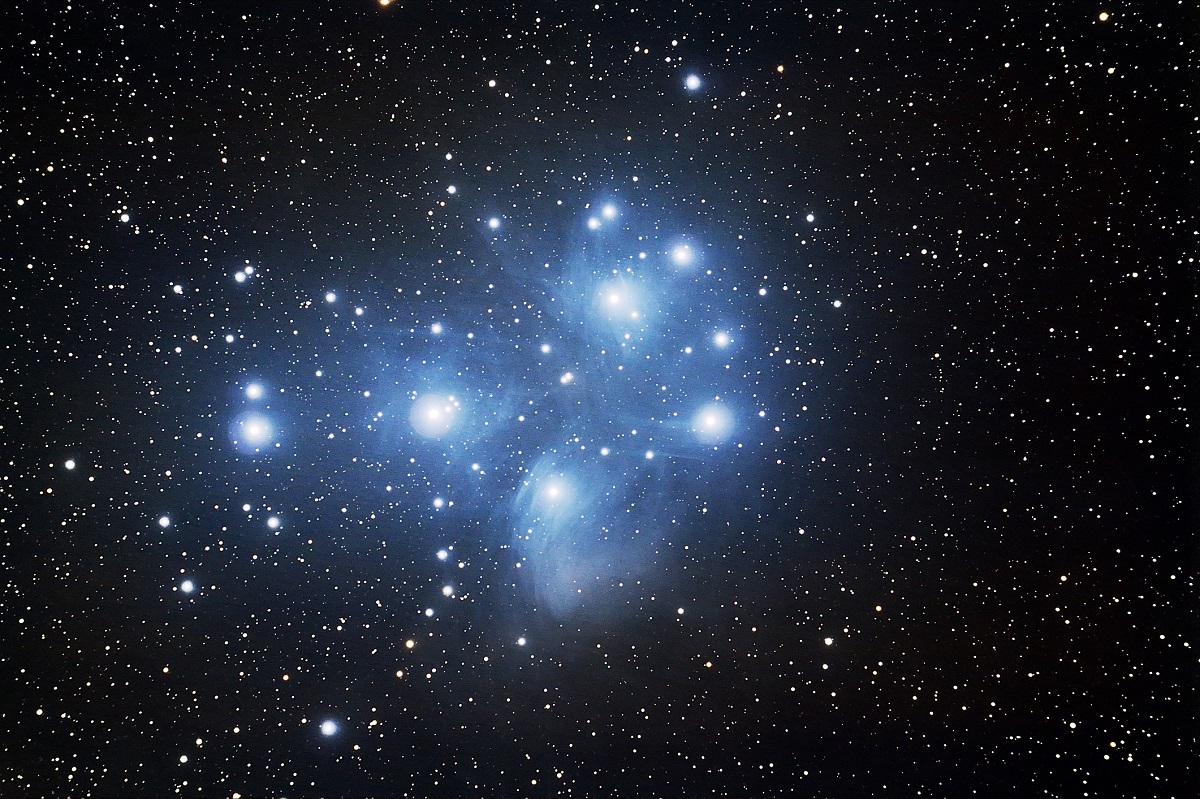
The Pleiades in Different Cultures and Mythologies
The Pleiades have been revered in various cultures and mythologies throughout history. In Greek cosmology, they represented the daughters of the Titan Atlas. In Japanese mythology, they are known as “Subaru” and symbolize unity and cooperation. Native Americans, such as the Cherokees and Lakotas, considered the Pleiades to be ancestors and sources of spiritual wisdom. These interpretations reflect the diversity and richness of the symbolism associated with this star cluster.
The Pleiades in Ancient Greek Cosmology
In Greek cosmology, the Pleiades were the seven daughters of the Titan Atlas and the nymph Pleione. Each of these sisters had her own myth and legacy. For example, Maia was the mother of Hermes, the messenger of the gods, while Electra was the mother of Dardanus, the founder of Troy. These connections with prominent figures in Greek mythology highlight the importance of the Pleiades in the Hellenic pantheon.
The Greek myth also tells that the Pleiades were transformed into stars by Zeus to save them from the hunter Orion, who pursued them relentlessly. This tale has been immortalized in the sky, where Orion continues to chase the Pleiades, symbolizing an eternal cosmic dance. The constellation of Taurus, where the Pleiades are located, also plays a crucial role in this myth, adding layers of meaning to their astronomical observation.
Western Hermeticism and Esoteric Symbolism
Western Hermeticism, based on the writings attributed to Hermes Trismegistus, sees the Pleiades as a source of knowledge and spiritual wisdom. In Hermetic tradition, it is believed that the Pleiades are a school of learning for advanced souls, where seekers of truth can access higher levels of consciousness and understanding.
Additionally, the Pleiades are associated with electric energy and spiritual illumination. In esoteric practice, meditating on the Pleiades can open portals to profound experiences and knowledge, facilitating spiritual growth and personal evolution. This esoteric symbolism reflects how the stars have been seen not only as celestial bodies but as spiritual guides and sources of power.
Norse, Celtic, and Bronze Age Mythology
In Norse mythology, the Pleiades were known as a group of stars associated with seasonal and agricultural events. The Vikings used their appearance in the night sky to mark the beginning of the seasons and guide their navigation activities. This connection with nature and everyday life shows the integration of the Pleiades into Norse culture, reflecting their importance in both agriculture and sea travel.
In Celtic mythology, the Pleiades were connected with the Samhain cycle, a festival that marked the end of the harvest season and the beginning of winter. This time of transition was considered a period when the veil between the world of the living and the dead was thinner, and the Pleiades played a crucial role in this context. Additionally, in the Bronze Age, the Nebra Sky Disk, found in Germany, shows a depiction of the cluster, indicating its importance in astronomical and religious practices of that time.
The Pleiades in Asian Cosmologies
In ancient China, the Pleiades were known as “Mao” and were part of the agricultural calendar. Their observation was crucial to determine the right time to plant and harvest. Furthermore, it was believed that these stars had a direct influence on the weather and seasons, becoming deeply integrated into Chinese agricultural and spiritual life.
In Japan, the Pleiades are called “Subaru,” which means “unite” or “gather together.” This association with unity is reflected in the logo of the car company Subaru, which features six stars representing the Pleiades. The importance of these stars in Japanese culture is also evident in festivals and spiritual practices, where they are seen as symbols of harmony and collaboration.
Pleiades Myths of Native Americans
For many Native American tribes, the Pleiades hold deep meaning. The Cherokees, for example, believe they are the souls of young people who ascended to the sky, symbolizing purity and the connection with spirit. In their myths, the Pleiades often represent ancestors and spiritual guides who protect and guide the tribes.
The Dakotas consider the Pleiades to be the dwelling place of the ancestors and believe that when people die, their souls travel to this star cluster. A popular myth tells the story of seven sisters who were chased by a giant bear. The gods lifted the sisters to the sky to save them, transforming them into the Pleiades, while the bear’s claw marks were left on the Devil’s Tower, a monolith in Wyoming. These stories highlight the rich spiritual connection between native peoples and the Pleiades.



